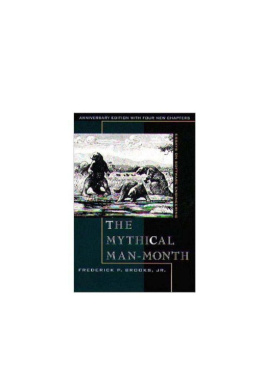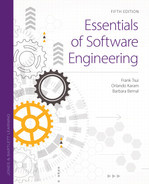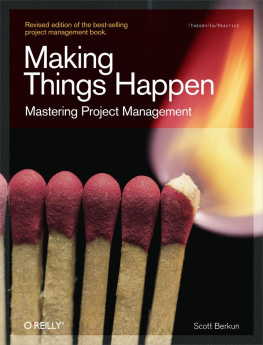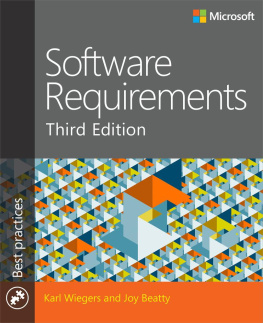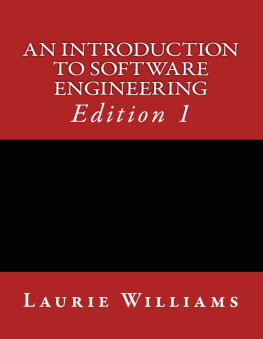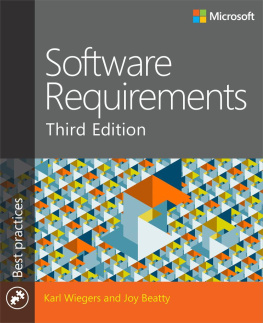
Photo credit: Jerry Markatos
ABOUT THE AUTHOR
Frederick P. Brooks, Jr., is Kenan Professor of Computer Science at the University of North Carolina at Chapel Hill. He is best known as the "father of the IBM System/360," having served as project manager for its development and later as manager of the Operating System/360 software project during its design phase. For this work he, Bob Evans, and Erich Bloch were awarded the National Medal of Technology in 1985. Earlier, he was an architect of the IBM Stretch and Harvest computers.
At Chapel Hill, Dr. Brooks founded the Department of Computer Science and chaired it from 1964 through 1984. He has served on the National Science Board and the Defense Science Board. His current teaching and research is in computer architecture, molecular graphics, and virtual environments.
The Mythical Man-Month
Essays on Software Engineering
Anniversary Edition
Frederick P. Brooks, Jr.
University of North Carolina at Chapel Hill

ADDISON-WESLEY
Boston San Francisco New York Toronto Montreal
London Munich Paris Madrid
Capetown Sydney Tokyo Singapore Mexico City
Cover drawing: C. R. Knight, Mural of the La Brea Tar Pits. Courtesy of the George C. Page Museum of La Brea Discoveries, The Natural History Museum of Los Angeles County. Cover designer: Diana Coe.
The essay entitled, No Silver Bullet, is from Information Processing 1986, the Proceedings of the IFIP Tenth World Computing Conference, edited by H.-J. Kugler, 1986, pages 1069-1076. Reprinted with the kind permission of IFIP and Elsevier Science B.V., Amsterdam, The Netherlands.
Library of Congress Cataloging-in-Publication Data
Brooks, Frederick P., Jr. (Frederick Phillips) The mythical man-month : essays on software engineering /
Frederick P. Brooks, Jr. Anniversary ed.
p. cm.
Includes bibliographical references and index.
ISBN 0-201-83595-9
1. Software engineering. I. Title.
QA76.758.B75 1995
005.1'068dc20
94-36653
CIP
Many of the designations used by manufacturers and sellers to distinguish their products are claimed as trademarks. Where those designations appear in this book, and Addison-Wesley was aware of a trademark claim, the designations have been printed in initial caps or all caps.
Copyright 1995 Addison Wesley Longman, Inc.
All rights reserved. No part of this publication may be reproduced, stored in a retrieval system, or transmitted in any form or by any means, electronic, mechanical, photocopying, recording, or otherwise, without prior written permission of the publisher and author. Printed in the United States of America.
Text printed on recycled and acid-free paper.
ISBN 0201835959
17 1819202122 MA 05 04 03 02
17th Printing August 2002
Dedication of the 1975 edition
To two who especially enriched my IBM years:
Thomas I. Watson, Jr.,
whose deep concern for people still permeates his company,
and
Bob O. Evans,
whose bold leadership turned work into adventure.
Dedication of the 1995 edition
To Nancy,
God's gift to me.
Preface to the 20th Anniversary Edition
To my surprise and delight, The Mythical Man-Month continues to be popular after 20 years. Over 250,000 copies are in print. People often ask which of the opinions and recommendations set forth in 1975 I still hold, and which have changed, and how. Whereas I have from time to time addressed that question in lectures, I have long wanted to essay it in writing.
Peter Gordon, now a Publishing Partner at Addison-Wesley, has been working with me patiently and helpfully since 1980. He proposed that we prepare an Anniversary Edition. We decided not to revise the original, but to reprint it untouched (except for trivial corrections) and to augment it with more current thoughts.
Chapter 16 reprints "No Silver Bullet: Essence and Accidents of Software Engineering," a 1986 IFIPS paper that grew out of my experience chairing a Defense Science Board study on military software. My coauthors of that study, and our executive secretary, Robert L. Patrick, were invaluable in bringing me back into touch with real-world large software projects. The paper was reprinted in 1987 in the IEEE Computer magazine, which gave it wide circulation.
"No Silver Bullet" proved provocative. It predicted that a decade would not see any programming technique that would by itself bring an order-of-magnitude improvement in software productivity. The decade has a year to run; my prediction seems safe. "NSB" has stimulated more and more spirited discussion in the literature than has The Mythical Man-Month. Chapter 17, therefore, comments on some of the published critique and updates the opinions set forth in 1986.
In preparing my retrospective and update of The Mythical Man-Month, I was struck by how few of the propositions asserted in it have been critiqued, proven, or disproven by ongoing software engineering research and experience. It proved useful to me now to catalog those propositions in raw form, stripped of supporting arguments and data. In hopes that these bald statements will invite arguments and facts to prove, disprove, update, or refine those propositions, I have included this outline as Chapter 18.
Chapter 19 is the updating essay itself. The reader should be warned that the new opinions are not nearly so well informed by experience in the trenches as the original book was. I have been at work in a university, not industry, and on small-scale projects, not large ones. Since 1986, I have only taught software engineering, not done research in it at all. My research has rather been on virtual environments and their applications.
In preparing this retrospective, I have sought the current views of friends who are indeed at work in software engineering. For a wonderful willingness to share views, to comment thoughtfully on drafts, and to re-educate me, I am indebted to Barry Boehm, Ken Brooks, Dick Case, James Coggins, Tom DeMarco, Jim McCarthy, David Parnas, Earl Wheeler, and Edward Yourdon. Fay Ward has superbly handled the technical production of the new chapters.
I thank Gordon Bell, Bruce Buchanan, Rick Hayes-Roth, my colleagues on the Defense Science Board Task Force on Military Software, and, most especially, David Parnas for their insights and stimulating ideas for, and Rebekah Bierly for technical production of, the paper printed here as Chapter 16. Analyzing the software problem into the categories of essence and accident was inspired by Nancy Greenwood Brooks, who used such analysis in a paper on Suzuki violin pedagogy.
Addison-Wesley's house custom did not permit me to acknowledge in the preface to the 1975 edition the key roles played by their staff. Two persons' contributions should be especially cited: Norman Stanton, then Executive Editor, and Herbert Boes, then Art Director. Boes developed the elegant style, which one reviewer especially cited: "wide margins, [and] imaginative use of typeface and layout." More important, he also made the crucial recommendation that every chapter have an opening picture. (I had only the Tar Pit and Reims Cathedral at the time.) Finding the pictures occasioned an extra year's work for me, but I am eternally grateful for the counsel.
Soli Deo gloria To God alone be glory.
F. P. B., Jr
Chapel Hill, N.C.
March 1995
Next page
